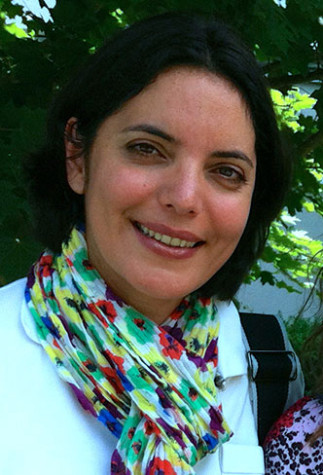Margaret Magdesian, Advanced Nano Design Applications, McGill University, Montréal, QC, Canada.
There are several limitations to study the mammalian nervous system. Difficult access and very small dimensions are recurring problems in neuroscience. Neurons extend through different organs creating a very complex network, where each connection has a specific role, fundamental to the proper function of the whole system. Neuronal connection and communication sites are called synapses, which vary in size in the nanometer range. Therefore, to investigate neuronal function, degeneration and repair, smaller and more precise tools are needed. We use microfluidics, microfabrication and Atomic Force Microspcopy (AFM) to grow and manipulate cellular development. We use microfluidics and microfabrication to develop silicone microdevices to organize and align cells in culture. Our microdevices enable the precise position of cells in rows micrometers apart from each other, promoting faster standardization of cultures and results. AFM offers high resolution and versatility for imaging, measuring, and manipulating matter at the nanoscale. With these tools we developed a new technique to create new, functional neuronal connections that can be used to directly (re)wire neuronal networks. Our findings challenge current understanding of the limits of neuronal growth and have direct implications for the development of new therapies and surgical techniques to achieve functional regeneration.
Margaret Magdesian, BSc Pharmacology, PhD Biochemistry (University of São Paulo), is the founder of ANANDA and an associate researcher at the Montreal Neurological Institute (MNI) and the McGill Department of Physics.
As an Associate Professor at the Federal University of Rio de Janeiro (Brazil), her research focused on the identification of early diagnostic markers for neurodegenerative diseases. Interested in the growing applications of nanotechnology in medicine, in 2008 she joined the Neuroengineering group to work as a Visiting Scientist with the director of the MNI, Dr. David Colman. Since then she has been working in the development of new micro- and nanotools to study the mechanism of neuronal degeneration and repair. Margaret has authored several peer-reviewed papers and book chapters and she received an award from the International Brain Research Organization.
Her work combines atomic force microscopy, microfabrication and microfluidic devices to culture different cell types. These miniaturized versions of bioassays offer many advantages, including: more physiological and biocompatible design, low cost, minimal reagent and sample requirements, plus integration with other micro- and nanoelectronic devices. She has also obtained 2 patents in the area of microdevices.
Seeing the opportunity to extend the use of the developed devices and techniques to other fields in medicine, in 2013 Margaret launched ANANDA, a joint venture between the MNI and the McGill Nanotools Microfab to expand the use and development of new microdevices to improve biomedical research and diagnostics. In 2014 she was a winner in the Innovation Driven Enterprise Track of the McGill Dobson Cup start-up competition.
Voici le lien vers la page web du groupe de recherche du Dr. Magdesian
Cette conférence est présentée par le RQMP Versant Nord du Département de physique de l'Université de Montréal et le Département de génie physique de Polytechnique Montréal.

